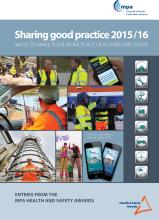A group of experts has looked at how to ensure a steady and secure supply of minerals to support the UK’s population and economy in the years to 2050 in the new report Future Minerals Scenarios for the UK.
The report shows how dependent the UK is on minerals, relying more and more on imports in an increasingly uncertain world. But the UK still has significant mineral resources in important sectors of the economy.
Future Minerals Scenarios for the UK sets out how these can secured sustainably through a national minerals strategy prepared in collaboration between the minerals industries, central and local government, environmentalists and regulators.
The group’s findings and recommendations for developing a shared vision for UK minerals will be reported to the
Speaking at the publication of Future Minerals Scenarios for the UK, the chairman of the UK Minerals Forum, Lester Hicks, said: “We cannot do without minerals, for energy, our homes, roads, railways, workplaces, hospitals, flood defence, chemicals and manufacturing. Many, especially for construction, are still obtained in the UK.
“These would be especially hard and expensive to import. So where we get them is important. This report shows how dependent we are on minerals, relying more and more on imports in an increasingly uncertain world. But the UK still has significant mineral resources in important sectors of the economy. Future Minerals Scenarios for the UK sets out how we can secure these sustainably through a national minerals strategy prepared in collaboration between the minerals industries, central and local government, environmentalists and regulators”.
The UK Minerals Forum is an independent body representing industry, regulators, and the environmental bodies, with observers from government departments and the UK’s devolved administrations. It is sponsored by the CBI Minerals Group.
The headline findings in the report show that despite the increasing contributions of renewable energy, resource efficiency and recycling, there will be a continuing need to extract minerals in the UK, requiring more effective strategic industrial planning; the UK faces increasing global competition for raw materials, but future supply cannot be guaranteed in the face of political instability and increasing restrictions in availability; uncertainty about the UK’s future relationship with the
The report also points out that the UK has adequate resources of many non-energy minerals, notably for construction, to 2050 and beyond and that long-term access to these minerals is crucial to support an expanding population through sustainable growth of an economy rebalanced towards manufacturing and production, providing more homes, renewed infrastructure and places of employment, low-carbon power generation and enhanced flood protection.
However, it says there is an urgent need to resolve the present conflict in UK national policies between securing lower carbon energy and carbon pricing. This discourages investment in essential mineral-based products such as bricks and cement, drives jobs abroad and exports our carbon footprint.
Continued access to minerals in the UK should not be at the expense of adverse impacts on the environment. So far the UK has generally been able to secure adequate and steady supplies within a highly protective environmental framework, and with care this should still be possible.
Continuing to meet the UK’s minerals needs as far as possible from UK resources cannot be taken for granted. All those involved (industry, environmental organisations, central and local government and other regulators) need to work together to develop a long-term national minerals strategy, as an integral part of the UK’s wider industrial strategy
Further details about the Living with Minerals 5 Conference and attending the event can be obtained from Mary Burling at: [email protected].
The experts’ report can be found %$Linker:





